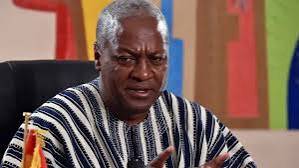What If Mahama Returns to Pay Back Ghanaians for the 2016 Loss?
The political landscape in Ghana has always been dynamic, shaped by the aspirations and frustrations of its citizens. John Dramani Mahama, former president and leader of the National Democratic Congress (NDC), faces a unique scenario as he potentially positions himself for a return to power in the wake of his party's significant defeat in the 2016 elections. If Mahama were to come back, many might wonder if he is aiming to repay Ghanaians for that overwhelming loss, and what implications this could have for the country.
Mahama’s presidency from 2012 to 2017 was marked by a mix of achievements and challenges. While he oversaw significant infrastructure projects and social initiatives, his administration also faced criticisms regarding economic mismanagement, power shortages, and corruption scandals. The loss in 2016, when Nana Akufo-Addo and the New Patriotic Party (NPP) secured a decisive victory, was a major turning point for the NDC. It not only marked a setback for Mahama personally but also a critical moment for the party, prompting a period of introspection and reorganization.
If Mahama intends to return as a form of restitution, it suggests a multifaceted approach to addressing the concerns of Ghanaians. Firstly, acknowledging the reasons behind the 2016 loss would be paramount. This involves addressing issues such as economic hardship, unemployment, and the rising cost of living that many Ghanaians continue to experience. Acknowledging these challenges and proposing viable solutions would be essential for regaining public trust.
Furthermore, Mahama could leverage his experience and lessons learned from his previous term to offer a more robust and responsive governance model. By focusing on transparency, accountability, and effective communication, he could seek to rebuild the NDC's credibility. Engaging directly with communities, understanding their needs, and incorporating their feedback into policy-making could enhance his approach and resonate with voters who felt neglected during his last term.
Another critical aspect would be economic revitalization. Ghanaians are increasingly concerned about the economy, particularly in light of recent global and local challenges. If Mahama were to present a clear, comprehensive economic strategy that focuses on job creation, infrastructure development, and social welfare, he could position himself as a leader capable of steering the country toward recovery. This strategy would also need to address issues of youth unemployment, which remains a significant concern.
Moreover, a return to power for Mahama would necessitate a strong emphasis on unity within the NDC and among the broader population. The political division exacerbated by previous electoral campaigns has left many Ghanaians feeling disenfranchised. Mahama’s ability to promote a message of reconciliation and collaboration, both within his party and with opposition groups, could be crucial in fostering a sense of national unity.
Finally, if Mahama genuinely seeks to pay back Ghanaians, he must prioritize good governance and ethical leadership. Rebuilding public trust requires a commitment to combatting corruption and ensuring that government resources are utilized for the benefit of all citizens, not a select few.
In conclusion, Mahama's potential return to the political arena could be seen as an opportunity to rectify past mistakes and fulfill the aspirations of Ghanaians. By focusing on listening to the people, proposing effective solutions, and leading with integrity, he could transform the narrative surrounding his previous tenure into a hopeful vision for Ghana’s future. As the political climate evolves, the question remains: can Mahama effectively demonstrate that he is ready to repay Ghanaians for their trust and support?


